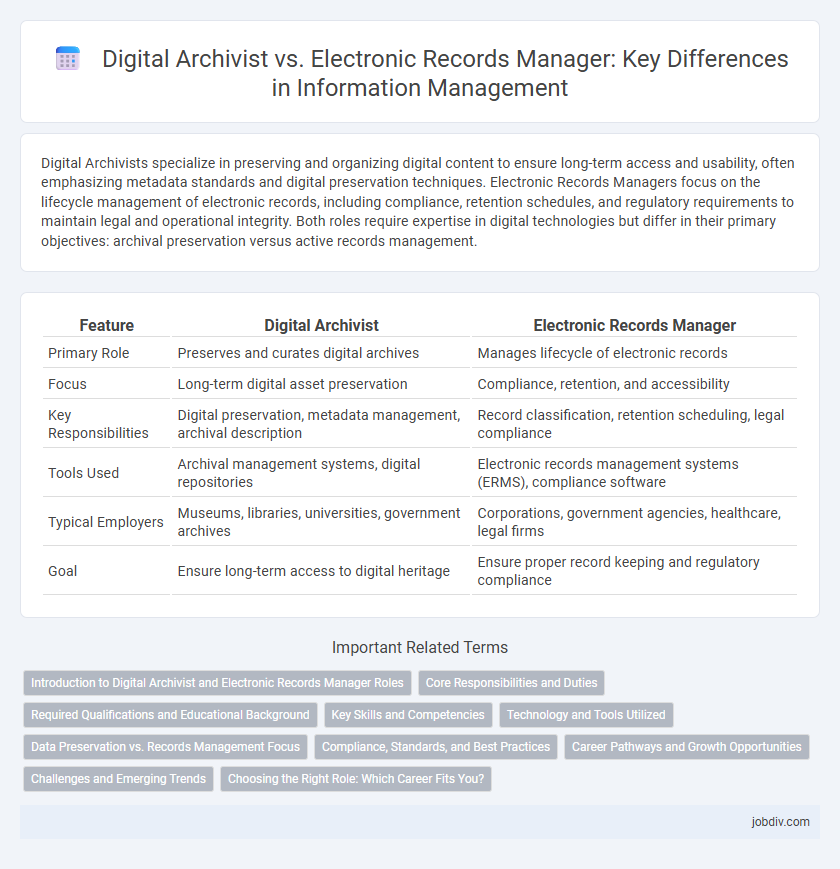Digital Archivists specialize in preserving and organizing digital content to ensure long-term access and usability, often emphasizing metadata standards and digital preservation techniques. Electronic Records Managers focus on the lifecycle management of electronic records, including compliance, retention schedules, and regulatory requirements to maintain legal and operational integrity. Both roles require expertise in digital technologies but differ in their primary objectives: archival preservation versus active records management.
Table of Comparison
| Feature | Digital Archivist | Electronic Records Manager |
|---|---|---|
| Primary Role | Preserves and curates digital archives | Manages lifecycle of electronic records |
| Focus | Long-term digital asset preservation | Compliance, retention, and accessibility |
| Key Responsibilities | Digital preservation, metadata management, archival description | Record classification, retention scheduling, legal compliance |
| Tools Used | Archival management systems, digital repositories | Electronic records management systems (ERMS), compliance software |
| Typical Employers | Museums, libraries, universities, government archives | Corporations, government agencies, healthcare, legal firms |
| Goal | Ensure long-term access to digital heritage | Ensure proper record keeping and regulatory compliance |
Introduction to Digital Archivist and Electronic Records Manager Roles
Digital Archivists specialize in preserving, organizing, and providing access to digital content, ensuring long-term usability of electronic materials across various platforms. Electronic Records Managers focus on the systematic control and governance of electronic records throughout their lifecycle, including creation, maintenance, and disposition. Both roles require expertise in digital information management, compliance with legal standards, and implementation of technology solutions for efficient data retrieval and preservation.
Core Responsibilities and Duties
Digital archivists are responsible for preserving, organizing, and providing access to digital collections, ensuring the long-term integrity and usability of electronic materials. Electronic records managers focus on the systematic control, storage, and disposal of electronic records in compliance with legal and organizational policies. Both roles prioritize metadata accuracy and digital preservation techniques but differ in their emphasis on archival curation versus records lifecycle management.
Required Qualifications and Educational Background
Digital Archivists typically require a master's degree in Library Science, Archival Science, or Information Management, emphasizing skills in digital preservation, metadata standards, and archival principles. Electronic Records Managers usually hold degrees in Records Management, Information Management, or Business Administration, with a focus on compliance, electronic records systems, and regulatory frameworks. Both roles demand proficiency in digital tools and technologies, but Digital Archivists prioritize long-term digital preservation, while Electronic Records Managers concentrate on lifecycle management and legal adherence.
Key Skills and Competencies
Digital Archivists excel in metadata standards, digital preservation techniques, and archival software proficiency, ensuring long-term access and integrity of digital assets. Electronic Records Managers specialize in records lifecycle management, compliance with legal and regulatory requirements, and implementation of electronic document management systems (EDMS) to organize and control information flow. Both roles require expertise in data governance, information security, and analytical skills to optimize digital information management within organizations.
Technology and Tools Utilized
Digital archivists primarily utilize advanced digital preservation systems and metadata management tools to ensure long-term accessibility and authenticity of digital assets. Electronic records managers focus on records management software, automated classification systems, and compliance tracking tools to organize, retain, and dispose of electronic documents according to regulatory standards. Both roles leverage cloud storage solutions and cybersecurity technologies to protect information integrity and facilitate efficient retrieval.
Data Preservation vs. Records Management Focus
Digital Archivists specialize in long-term data preservation, ensuring the integrity and accessibility of digital assets through metadata standards and digital curation techniques. Electronic Records Managers concentrate on records management, focusing on compliance, lifecycle management, and legal retention policies for electronic records. Both roles utilize information governance but differ in prioritizing archival preservation versus active records administration.
Compliance, Standards, and Best Practices
Digital Archivists specialize in preserving and providing access to digital collections by adhering to archival standards such as OAIS (Open Archival Information System) and ensuring long-term usability and authenticity. Electronic Records Managers emphasize compliance with regulatory frameworks like GDPR, HIPAA, and ISO 15489, focusing on records retention schedules, secure metadata management, and audit trails to meet legal and organizational requirements. Both roles implement best practices involving data integrity, chain of custody, and consistent documentation to maintain reliable and compliant digital information governance.
Career Pathways and Growth Opportunities
Digital Archivists specialize in preserving and organizing digital content with skills in metadata standards, digital preservation techniques, and archival theory, often advancing into senior archival or digital curation roles. Electronic Records Managers focus on the lifecycle management of electronic records, regulatory compliance, and information governance, with growth opportunities including compliance officer, records management consultant, or information governance manager. Both career pathways offer expansion into roles that integrate emerging technologies such as AI and cloud-based records management systems, enhancing long-term professional development.
Challenges and Emerging Trends
Digital archivists face challenges in preserving diverse digital formats and ensuring long-term accessibility, while electronic records managers grapple with compliance, data security, and efficient retrieval systems. Emerging trends include the adoption of AI-driven tools for metadata tagging, blockchain for secure recordkeeping, and cloud-based platforms facilitating scalability and remote access. Both roles increasingly demand integration of automation and enhanced digital preservation standards to address evolving technological complexities.
Choosing the Right Role: Which Career Fits You?
Digital Archivists specialize in preserving and organizing digital assets, ensuring long-term accessibility and cultural or historical value, while Electronic Records Managers focus on managing the lifecycle of electronic records to comply with legal and organizational policies. Selecting the right career depends on your interest in either safeguarding digital heritage or implementing records management strategies that support information governance. Understanding key certifications like CRM (Certified Records Manager) for Records Managers and digital curation skills for Archivists helps align your professional path with industry demands.
Digital Archivist vs Electronic Records Manager Infographic

 jobdiv.com
jobdiv.com